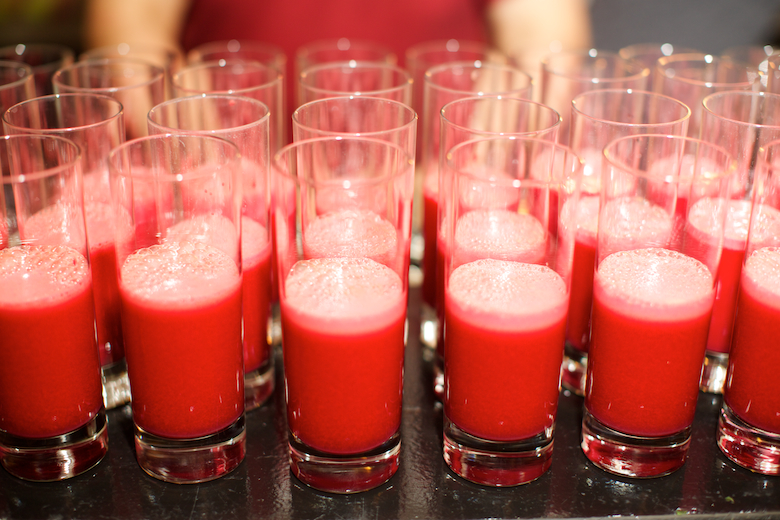When you talk about juice today, the conversation can get really intense: you have the strong believers versus the firm opponents, the cold press advocates versus the centrifuge defenders, the pro-HPP (high pressure processing) versus the no HPP. To give a range of specialists a voice, Edible Manhattan partnered with Breville on September 23 for a Juicing Summit: a gathering of members of the juicing trade or journalists in the health and wellness field to discuss the ins and outs of the industry.
What do we actually call juice? As Joe Cross (filmmaker and founder and CEO of Reboot with Joe) pointed out, whether you ask this question in Manhattan or elsewhere in the country, you’ll most likely get two completely different answers. In one case, juice will automatically be understood as fresh juice; in the other, it could as well refer to canned full of sugar cranberry juice. In other words, the industry still hasa big lexical challenges. That juice refers to the water you can get out of a fruit isn’t obvious for many. In this regard, Joe Cross is trying to spread modern (and particularly urbanite) juicing the word through his movies.
According to all the panelists, the goal of juicing is actually to encourage people to not only drink juices for a few days, but to incorporate them in their daily diet. They see juices as an effective and easy way to embrace a plant-based diet that is better for both our bodies and the environment. This evolution of the way we consume juices raises questions about the state and the future of the juice industry: Could green be the new gold?
Juicing is quickly becoming a big business that more and more companies are embracing. Martin Bates, Organic Avenue’s new CEO, and Karliin Brooks, founder and CEO of The Squeeze, noted the explosive growth of the juice market. Karliin Brooks explained how she had to scale up very quickly to respond to the growing demand. However, Maury Rubin (City Bakery’s founder) ventured to share the hypothesis that the juicing market might already have reached its peak. How many people are actually just trying once? How many are repeat customers?
Both Martin Bates and Maury Rubin highlighted that selling just one product in our volatile economy is very risky. Thus, having a pluralistic approach to a venue is key. For this reason, Organic Avenue is now, under Martin Bates’ guidance, branching out and turning into a food business that sells juice. Diversifying the offer of the company and becoming more flexible with price margins could in the end make it possible to compress prices that still remain an obstacle to the democratization of juice consumption.
The question of juice accessibility was in fact brought up from multiple angles. First, from a pure economical prospective, that a juice costs in average $10 when the minimum wage per hour in New City is $8 makes it unrealistic for many to participate in the juicing trend. Then, addressing the question of pro-HPP versus no HPP from a geographical accessibility prospective enables us to go beyond a simplifying black-and-white opposition. According to Max Goldberg (founder of livingmaxwell.com), Latham Thomas (founder of Mama Glow), and Joe Cross, HPP hasn’t been communicated in the best way. In their opinion, HPP can give people access to juice in situations where it’s hard to find fresh juice — parts of the country with no juice shops, airports, hospitals, etc. Thus, it would be more meaningful to consider fresh juice and HPP juice along a same continuum, with fresh juice being a better option than HPP juice but not considering HPP juice a bad option.
Finally, from a convenience prospective, having people juice at home would be a way to lower the prices and make juicing more accessible. Latham Thomas mentioned that making the juicer cleaning process easier is crucial if we want to put people into action. Joe Cross added that it would be even more effective if we convinced kids to participate since, as he argued, they’re more likely to adopt new habits if they start at a young age.
The Juicing Summit was thus an occasion for members of the juicing trade and journalists in the health and wellness field to engage in an elevated conversation about the future of this trend. Will we witness juice democratization? Have we actually reached “peak juice?” What’s HPP and who cares? Depends on who you ask.



Photo credit: Clay Williams



